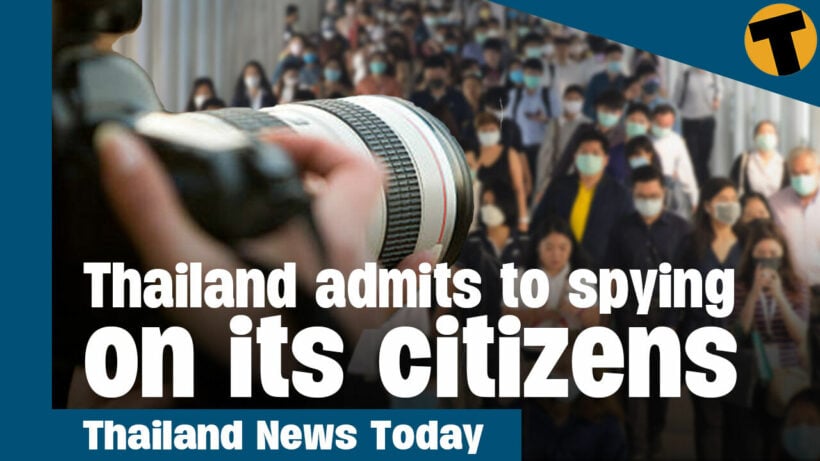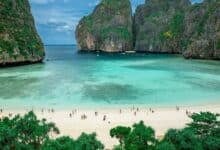Thailand News Today | Thailand admits to spying on its citizens

Less than a day after police denied using spyware to track Thai democracy activists, a government minister admitted Thailand does use surveillance to monitor its citizens.
Successive Thai governments have been accused by Human rights groups of using broad definitions of national security as an excuse to prosecute or suppress the activities of their main rivals.
This past Monday, a joint investigation by Thai human rights group iLaw, southeast Asian Internet watchdog Digital Reach, and Toronto-based Citizen Lab revealed the Thai government had used spyware called Pegasus on about 30 government critics between October 2020 and November 2021.
The report makes it known that Pegasus spyware was found on the phones of leading Thai protest organisers.
In parliament, late on Tuesday, Minister of Digital Economy and Society, Chaiwut Thanakmanusorn, confessed the kingdom did use surveillance software to track individuals in cases involving national security or drugs.
Chaiwut did not name the controversial Israeli spyware Pegasus but admitted he was aware of spyware being used to, quote “Listen into or access a mobile phone to view the screen, monitor conversations, and messages.”
Astonishingly, the government minister acknowledged it would be unlawful to use such software, but that it only did it on, quote, special cases such as national security or drug matters.
A Thai police spokesperson yesterday said that while the police are bound by duty to maintain peace and order, they claim they never used spyware to monitor protests, online activity, or funding sources.
We at the Thaiger will continue to give this development the coverage it deserves.
——————-
The latest sub-variant of the Covid-19 virus, BA 2.75, has been detected in the southern Thai province of Trang. Here’s the latest on what we know about its transmissibility and severity.
Like BA.4 and .5, the more recent BA. 2.75 sub-variant is a more transmissible sub-variant of the Omicron strain. It was first detected in India early June and had already spread to 14 other countries.
Singapore recently confirmed its first two cases of BA.2.75, from passengers returning from India on July 17. They were asymptomatic and recovered by themselves in isolation. The Singapore Ministry of Health says it had not found any evidence that BA.2.75 caused severe illness.
Even though BA. 2.75 is thought to be highly contagious and capable of “vaccine evasion”, as well as immunity from previous infections, it remains unknown if the mutation causes more serious disease than other variants.
Dr Benjamin Schwessinger from the Australian National University says that s recent study suggests that BA. 2.75 is less immune evasive than BA.4 and .5, which means previous vaccinations or infections of the Omicron variant provide a person with better protection.
“At the same time the study found that it is more immune evasive in individuals with prior Delta infection. Hence the growth advantage of BA.2.75 might very well be population dependent.”
—————–
Bangkok suffered from heavy rainfall last night where several communities and roads were swamped by high water levels that reached more than 30 centimetres high.
The Bangkok Governor Chadchart Sittipunt visited several different flood areas last night to find solutions to prevent and solve future floods in the capital.
At 1am today, the media reported that more than five roads in Bangkok were under the water. The downpour started at about 8pm yesterday and rained very hard for several hours.
Last night, Chadchart and his team visited Bangkok Flood Control Centres to monitor the water levels, driving to view different areas.
He Live Streamed his findings on Facebook. The video showed that the flood cut out the engines of many cars along the roads, and people on their way home from work had to walk along flooded pedestrian pathways.
Chadchart promoted solutions to solve the city floods in May’s Bangkok governor election. He said 3,000 kilometres of Bangkok sewers need to be cleaned every year, and the cleaning bill would cost about 3 hundred million baht. The governor also suggested that Bangkok should have more detention basins and develop a database to indicate the risk areas.
The Department of the Meteorological Department warned people to be prepared as Thailand will face more heavy rain until Sunday, July 24.
———————–
Tourists in Phuket can now rent the fully electric Nissan Leaf and cruise around Phuket without producing any harmful emissions, or more importantly, any money given to overpriced taxi rides.
SIXT Thailand partnered with InterContinental Phuket Resort on the project, who have installed a series of EV charging stations compatible with all EVs at their resort at Kamala Bay on the west coast of the island. The six charging stations offer fast charging for anyone, not just hotel guests.
To celebrate the launch of the Nissan Leaf, every customer who rents an EV from SIXT Thailand and charges it at the resort will receive a complimentary cup of tea or coffee and a slice of cake at the hotel’s Devas’ lounge. The offer is available from now until December 31.
Thailand’s government is also pushing the use of EVs and approved a budget of 3 billion baht to subsidise the price of EVs for Thai buyers back in March. Free-to-use EV charging stations have also been installed in Bangkok’s Benjakitti Park, “to promote the shift towards a low carbon society.” The BMA plans to install EV charging stations at ten more locations in the capital in the future.
In May, Tesla registered as a company in Thailand, to sell EVs in the kingdom, but not manufacturing. Tesla joins a long list of companies who have already started selling – or have expressed an interest in either manufacturing or selling – EVs in Thailand, including Great Wall Motor, MG Camp, Benz, BMW, Honda, Mitsubishi, Nissan, Foxconn, and Neta.
—————
Thailand’s iconic Maya Bay – located on Koh Pi Pi Leh in Krabi province – will be off-limits to tourists for the duration of August and September for another period of environmental restoration.
The bay, made famous by “The Beach” starring Leonardo DiCaprio, reopened to tourists on January 1 after a three and a half year closure.
All tourist activities will be temporarily suspended between August 1 and September 30 to give both onshore and offshore ecosystems at Maya Bay a chance to recover from a busy seven months of tourism since the bay’s reopening on January 1.
Maya Bay reopened under strict environmental protection measures. For the past seven months, tourists would visit the bay for one hour only between 10am – 4pm. The number of tourists allowed on the 250-metre long stretch of beach was limited to 375 people per hour. After one hour, national park officials would escort tourists away and bring a new group of tourists onto the beach.
Swimming was limited to a designated area and boats were asked to dock on the pier side of the island only, with a maximum of eight boats allowed at any one time.
Temporarily closures of Maya Bay are expected to become an annual occurrence to protect the bay’s sensitive ecology. As much as 50% of Maya Bay’s coral was destroyed by years of unrestricted tourism, with as many as 6000 people visiting the bay every day at the bay’s height of popularity, prompting its sudden closure in 2018.
Latest Thailand News
Follow The Thaiger on Google News:


























